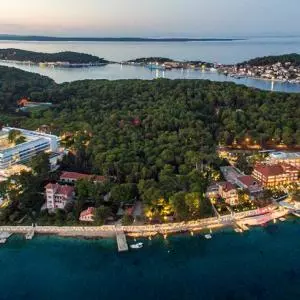U Hrvatskoj je ove godine do početka listopada Ministartsvo unutarnjih poslova ( MUP ) izdao više od 133 tisuća dozvola za boravak i rad strancima koji dolaze iz trećih zemalja. Najveći dio dozvola izdan je u graditeljstvu, turizmu i ugostiteljstvu kao i svih ovih godina. Konkretnije, u turizmu je zatraženo preko 40 tisuća dozvola za rad stranaca.
Zanimljivo je kako je broj izdanih dozvola za rad stranaca nadmašio broj nezaposlenih u evidenciji Hrvatskog zavoda za zapošljavanje ( HZZ ) kojih je trenutno manje od 110 tisuća, piše Poslovni dnevnik.
Usporkos velikoj liberalizaciji i ubrzavanju procesa prijave dozvola za rad stranaca, kao i mnogo agnecija koje nude svoje posredovanje, poslodavci su i dalje zabrinuti jer radne snage svakim danom sve više nedostaje. Iako se trenutno svi bore kako bi samo popunili potrebnu kvotu za brojem zaposlenika, veći je problem nedostatak kvalificiranih radnika, o kojem se malo priča.
HRT je jučer objavio novo HRejting istraživanje vezano uz stajalište hrvatskih građana oko zapošljavanja stranih radnika. Istraživanje je provedeno od 14. do 17. studenog na uzorku od 1100 ispitanika, uz mogućnost pogreške +/- 3,54% i pouzdanost od 95%.
Na pitanje podržavaju li zapošljavanje stranih radnika u Hrvatskoj, 46,4% ispitanih odgovorilo je da potpuno ili uglavnom podržava, 37,2% uglavnom ili nikako ne podržava dok 6,4% ispitanika nije znalo ili nije željelo odgovoriti na to pitanje.
Kao argument zašto ispitanici podržavaju zapošljavanje stranih radnika više od polovice, njih 55,2% kao razlog navodi da moramo zapošljavati strance jer nema domaćih radnika. DIo ispitanika, točnije njih 11,2%, smatra da domaći radnici ne žele obavljati slabije plaćene poslove, 10,6% da bi bez stranih radnika stale neke grane hrvatskog gospodarstva te 7,8% smatra da su strani radnici vjerniji poslodavcima od domaćih.
Oni koji ne podržavaju zapošljavanje stranih radnika smatraju kako stranci ugrožavaju radna mjesta i visine plaća hrvatskih radnika ( 32,2% ), preko 17 % ispitanika smatra da ne znaju naš jezik, kulturu i običaje te da ne žele ni učiti, 16,9% smatra da domaći poslodavci iskorištavaju strane radnike dok njih 13,4% smatra da nisu stručni i pouzdani kao hrvatski radnici.
S druge strane, pitanje je i koji su najveći problem stranih radnika u Hrvatskoj. Za najviše ispitanih, 36,9%, to je nepoznavanje hrvatskog jezika, kulture i običaja, 13,9% smatra da su slabo plaćeni za poslove koje obavljaju, 9,5% strani radnici žive u nehumanim uvjetima dok 8,3% smatra da su njihov najveći problem predrasude koje prema njima imaju hrvatski građani.
Strani radnici se žale kako je Hrvatska skupa za život i traže bolje uvijete.
Također, još jedna zanimljivost je kako su se strani radnici počeli žaliti kako je Hrvatska skupa za život i traže bolje uvijete.
Sunil Bam, dopredsjednik udruge Nepalaca, koju su prošle godine osnovali udrugu Nepalaca u Hrvatskoj, nedavno je za N1 komentirao kako im najveći problem predstavlja pronaći posao jer su mnogi došli kao sezonski radnici i nakon sezone ostali bez posla.
Prošle godine su osnovali udrugu Nepalaca u Hrvatskoj, a najveći problem im predstavlja pronaći posao jer su mnogi došli kao sezonski radnici i nakon sezone ostali bez posla. “Mnogi Nepalcima je prilikom dolaska na aerodrom rečeno da su njihove vize poništene i deportirali su ih. To je pogreška tvrtke koja im je omogućila da dođu i na temelju čega su dobili vizu. Cijeli proces traje par mjeseci i to je dugo. Hrvatska je skuplja nego Nepal, mi bismo htjeli plaću od oko 1.000 eura ako moramo plaćati smještaj i hranu. Zapravo je vrlo skupo”, zaključio je Bam.
I dalje samo kratkoročno gasimo požar, da popunimo kvotu koja nam je potrebna, a problematika i implikacije za naše tržište rada, kao i gospodarstvo, su puno širi. No kao da do sada i dalje nismo ništa naučili.
Demografska slika u Hrvatskoj je sve gora, sve je više umirovljenika, dok istovremeno mladi i dalje odlaze iz Hrvatske, a raste broj stranih radnika. Koji je dugoročni cilj i smisao svega? Koje su implikacije? Koji je korijen problema? ... - puno pitanja, no nema odgovora.
Izvori: HRT, Poslovni dnevnik , N1, / Foto: CA Creative on Unsplash








